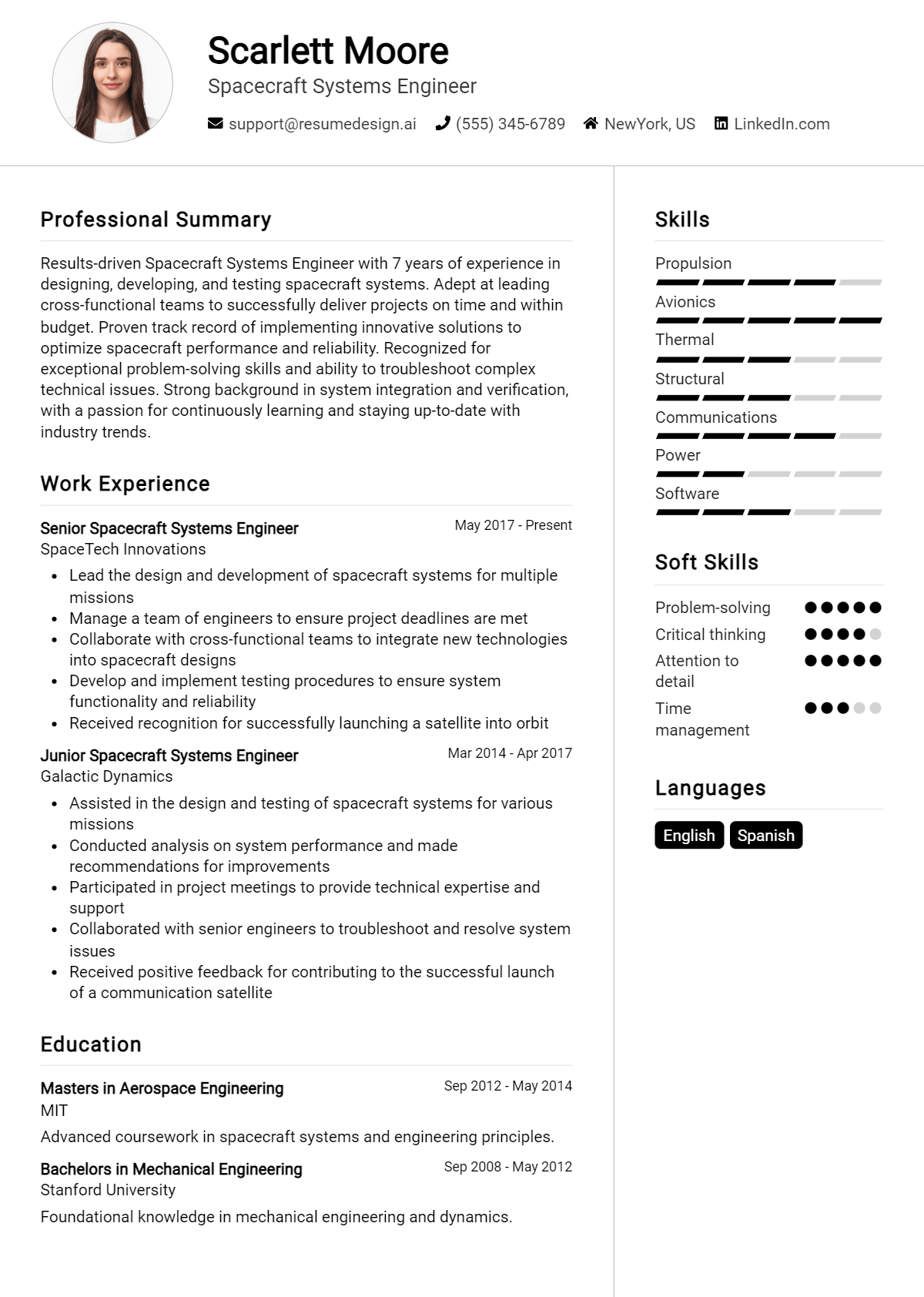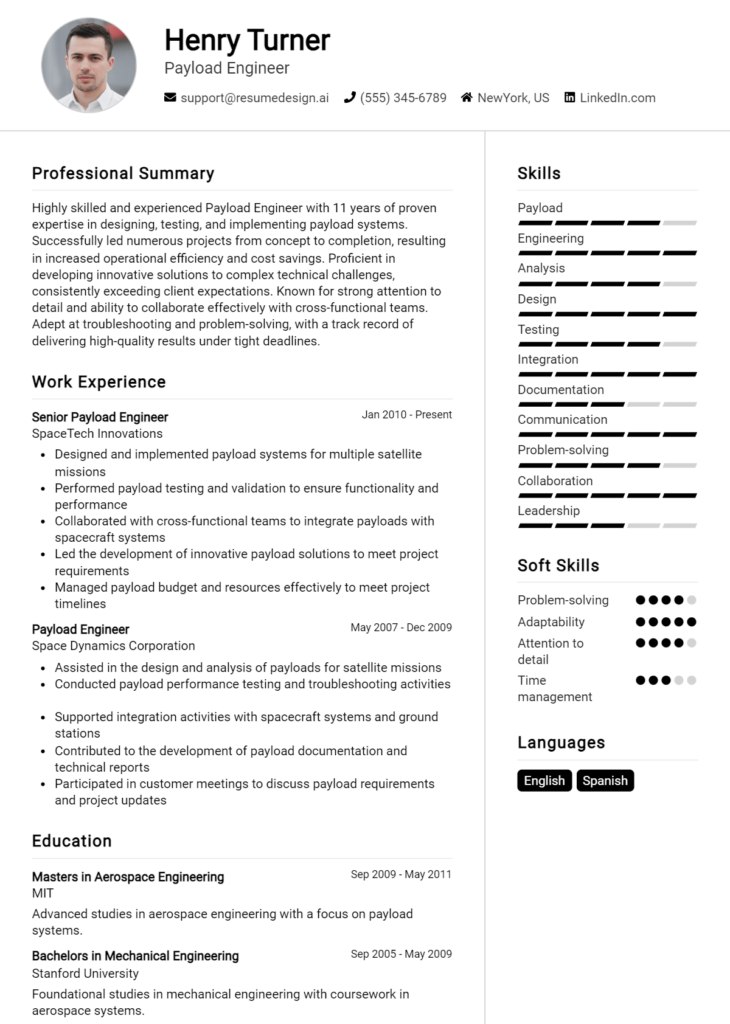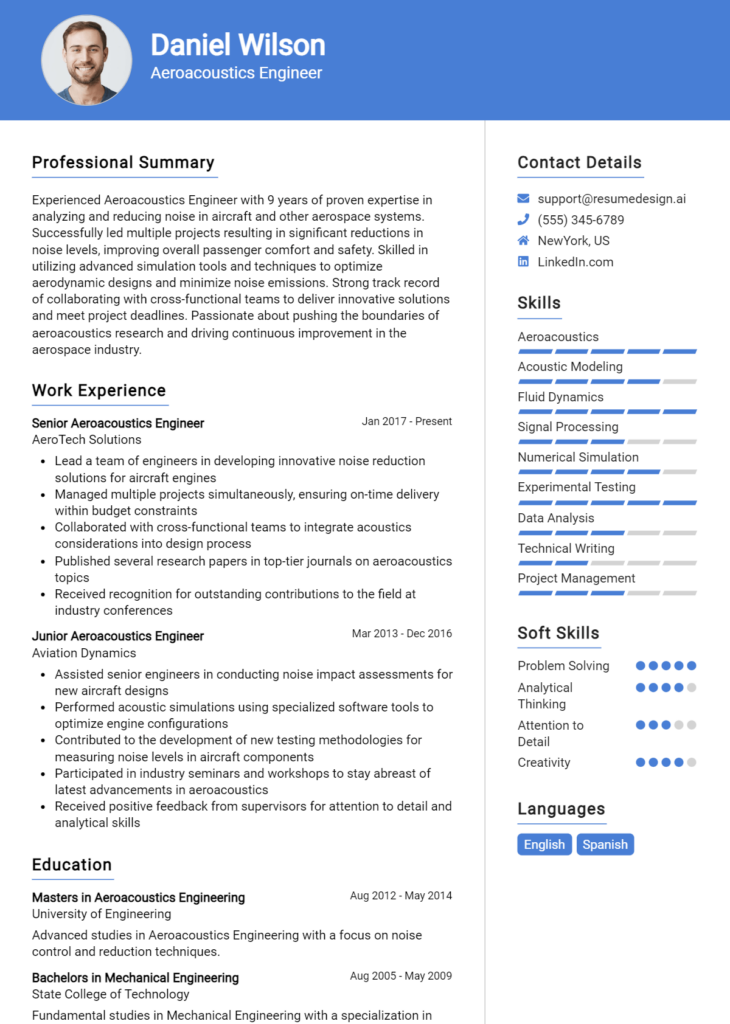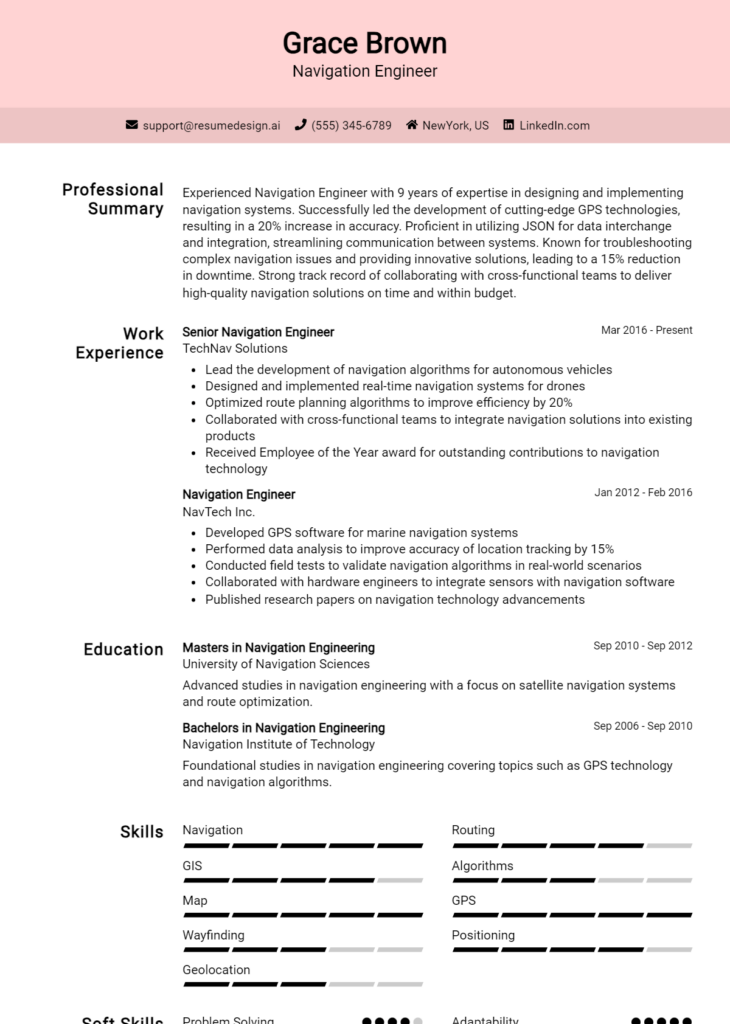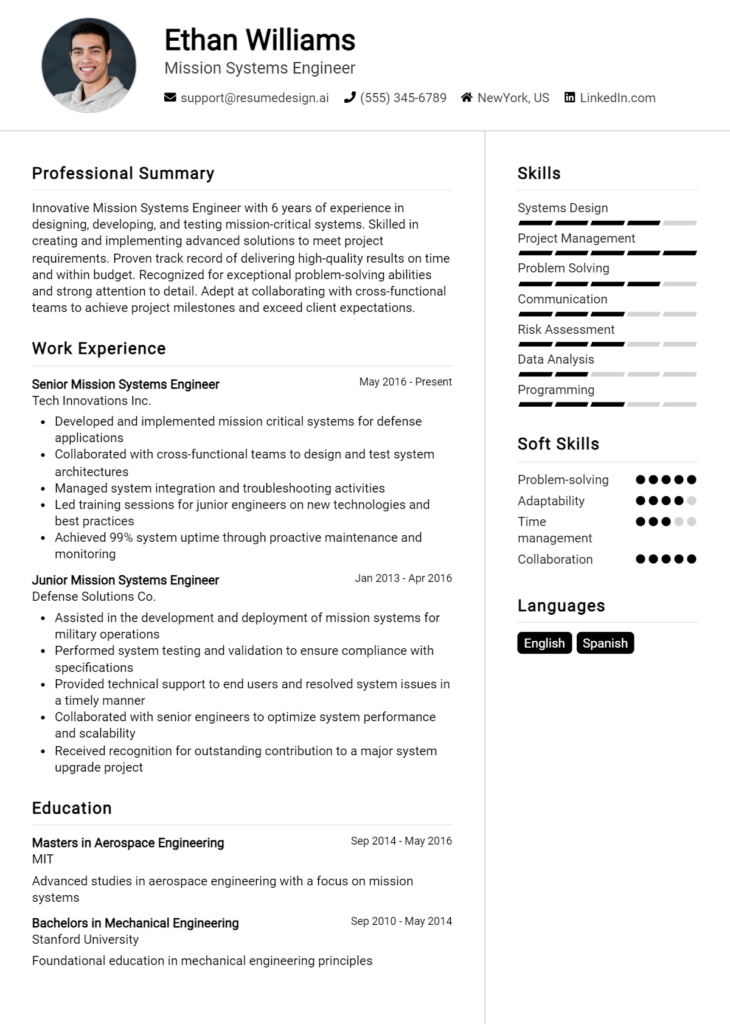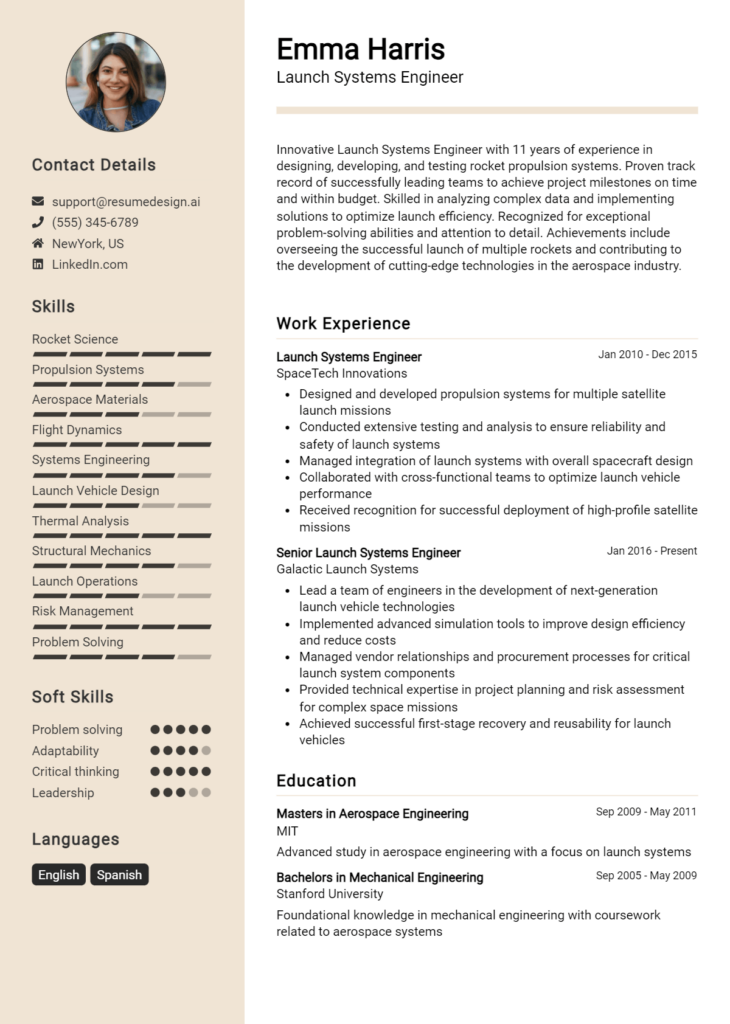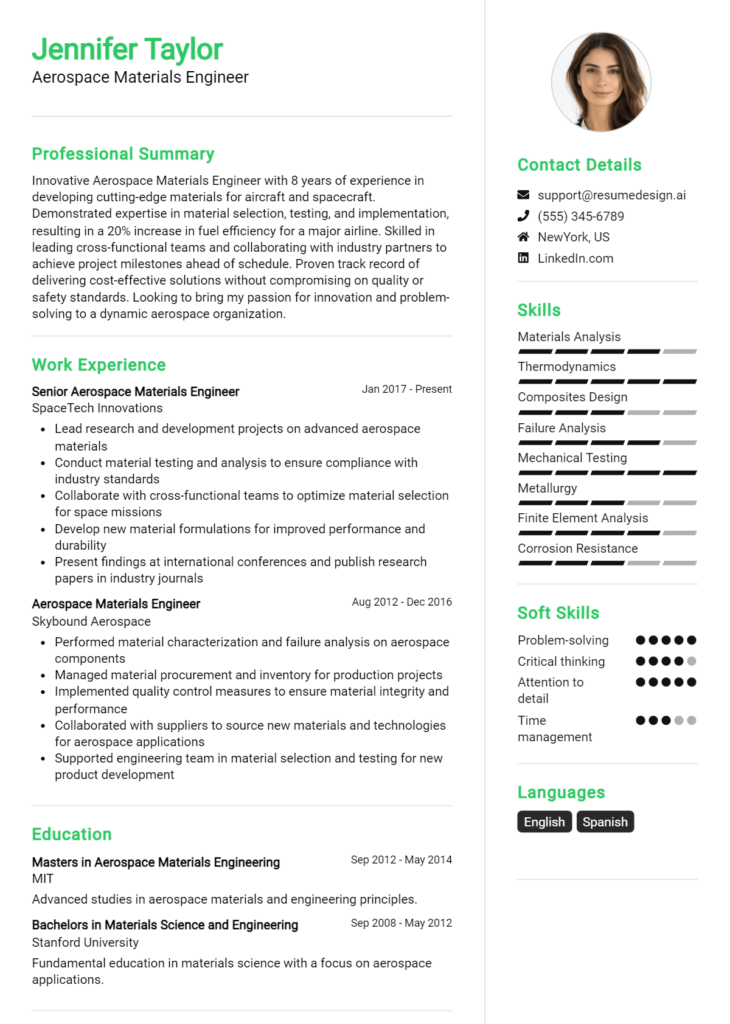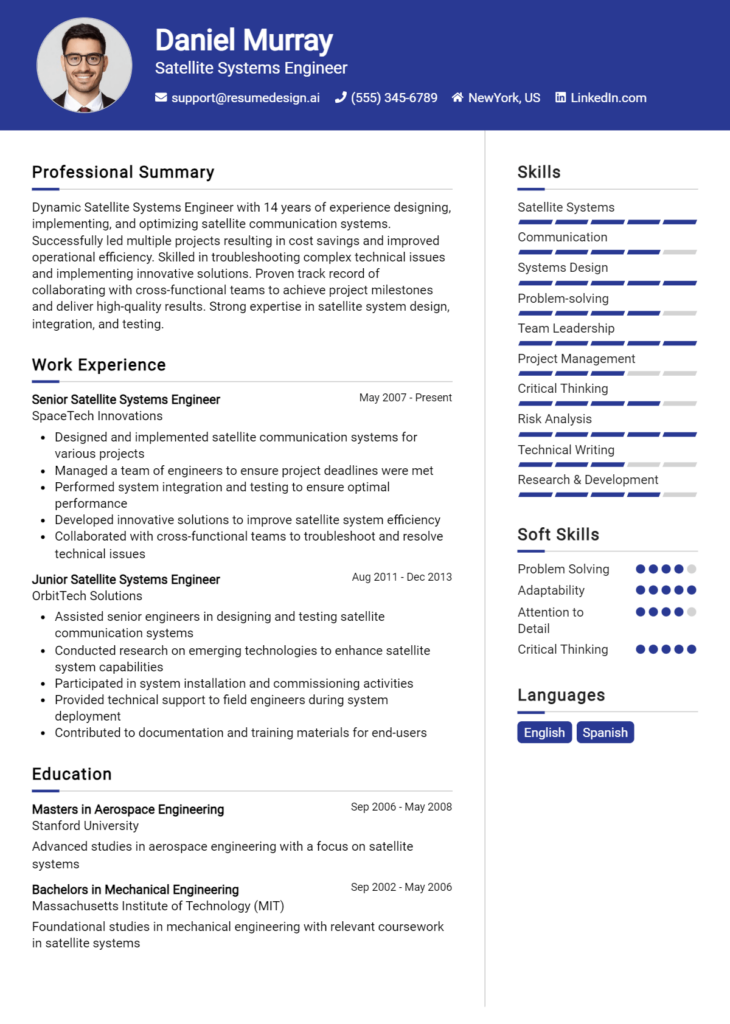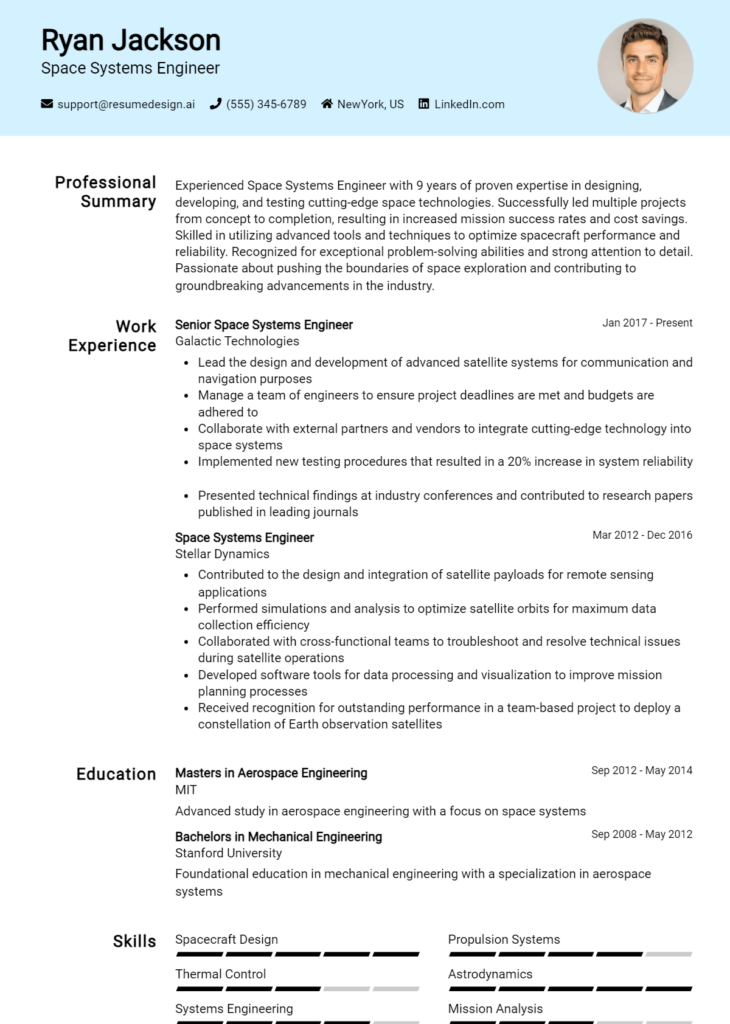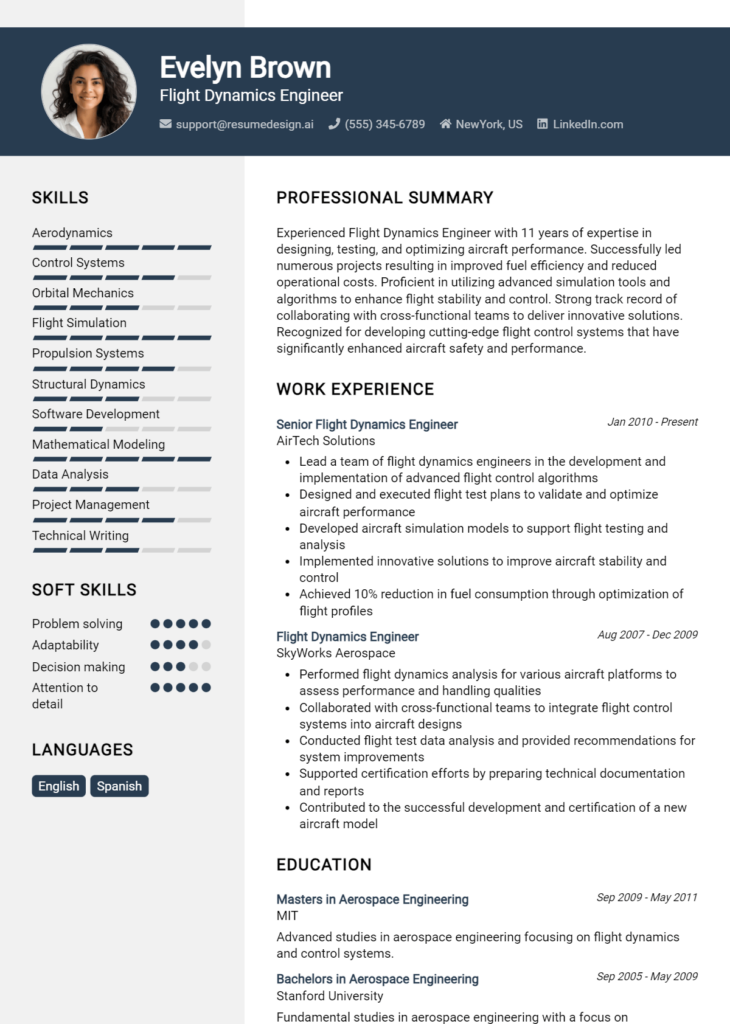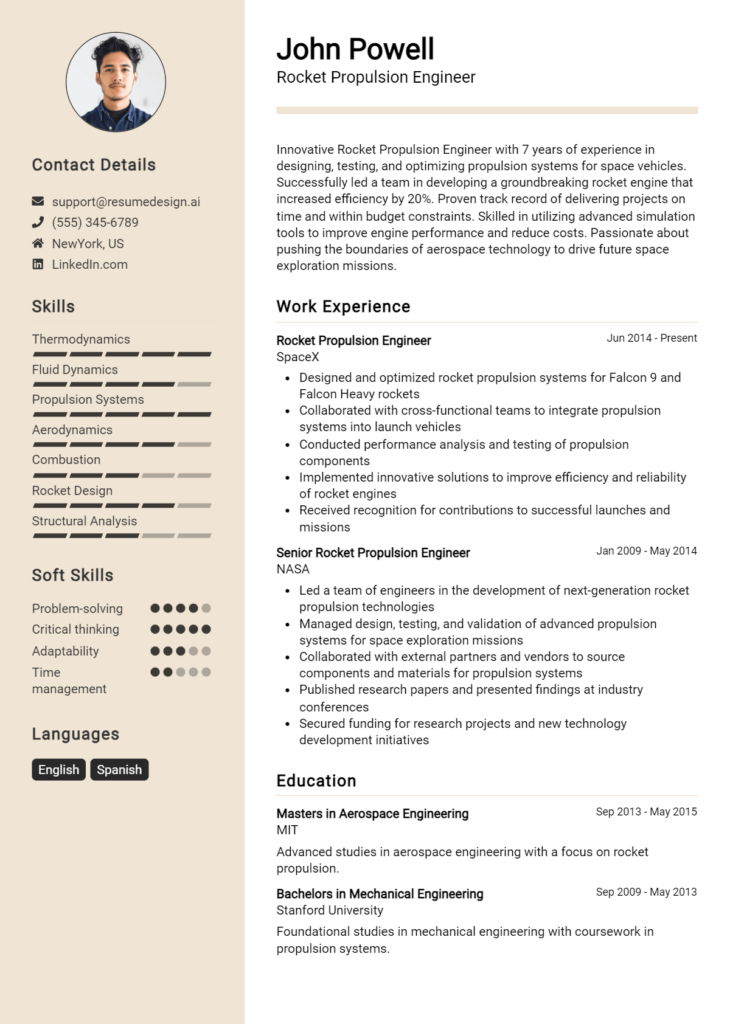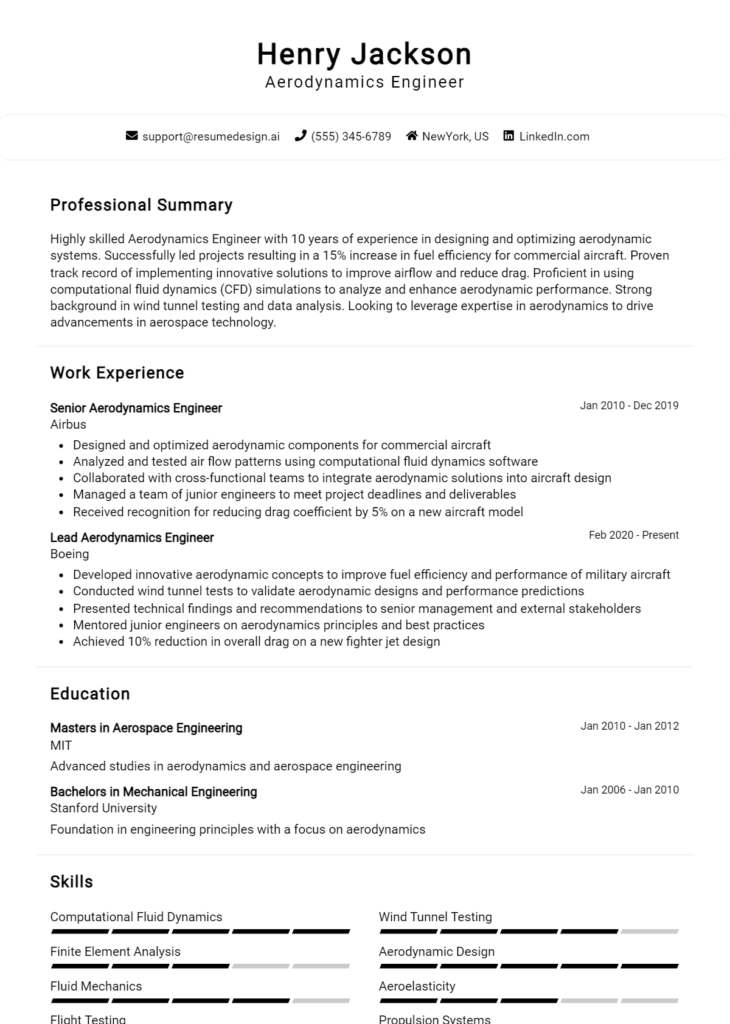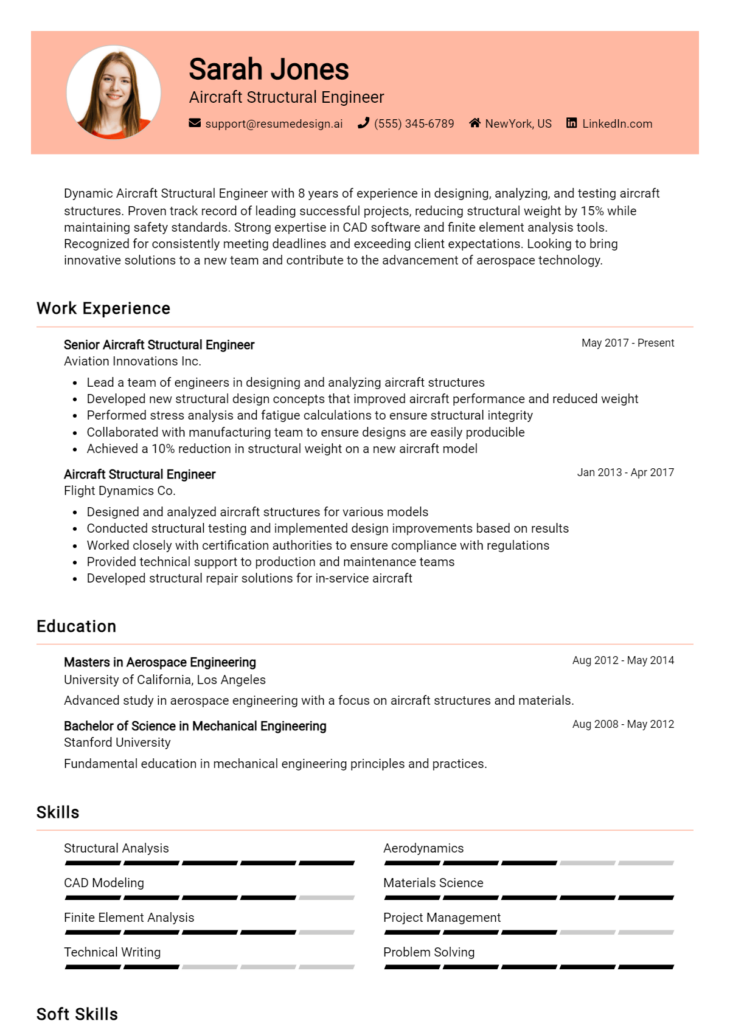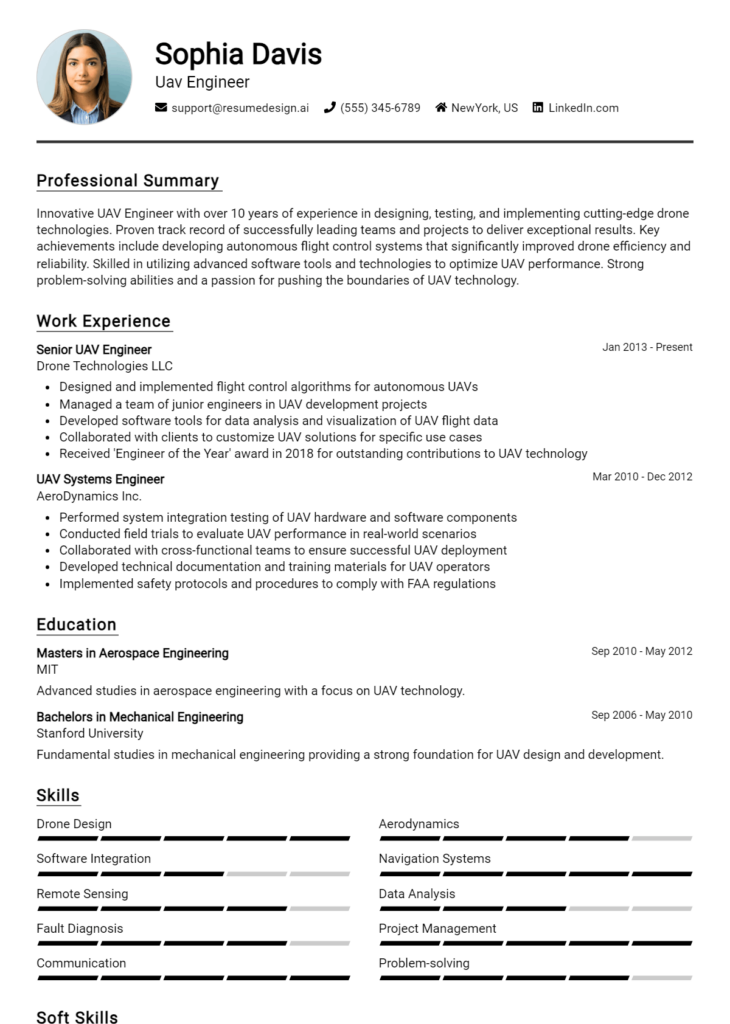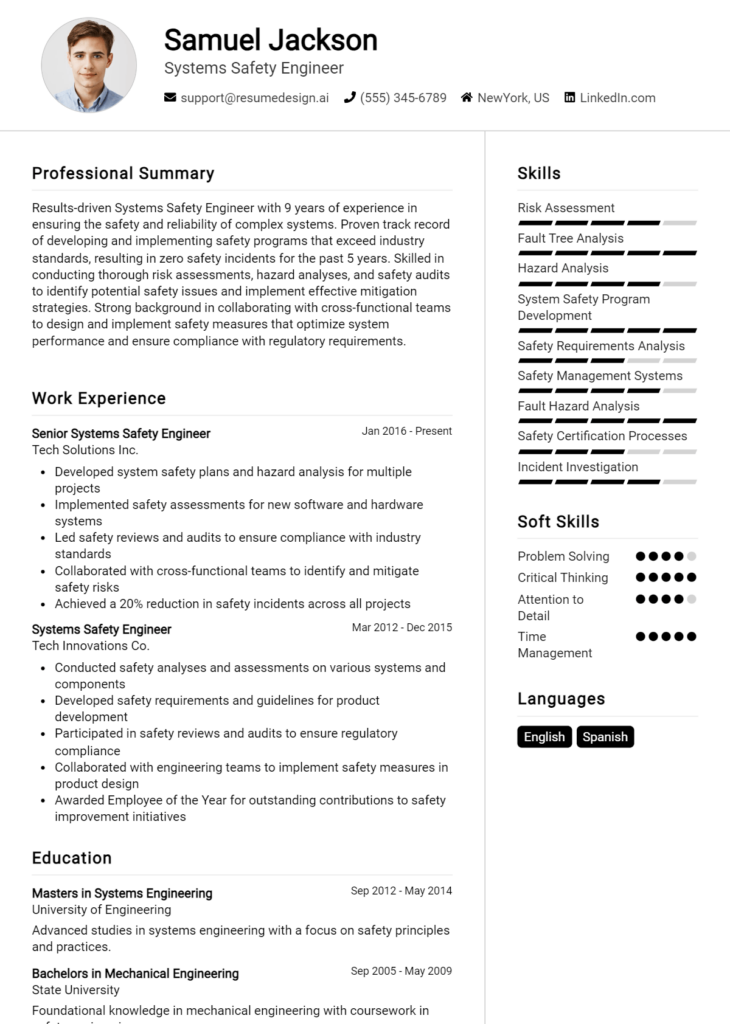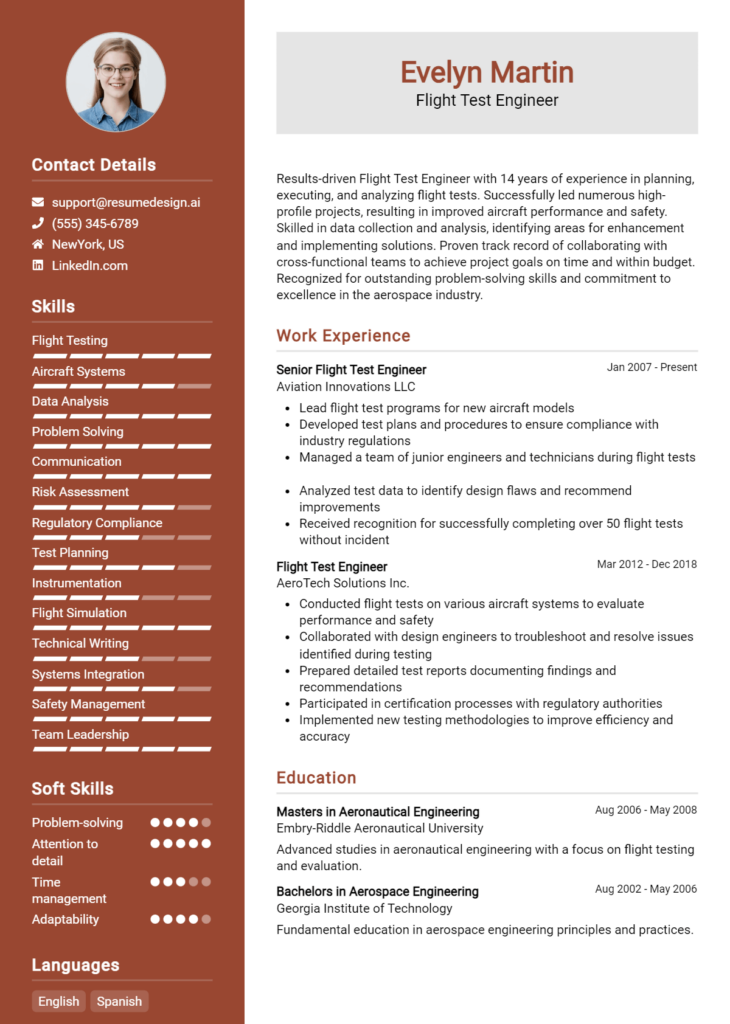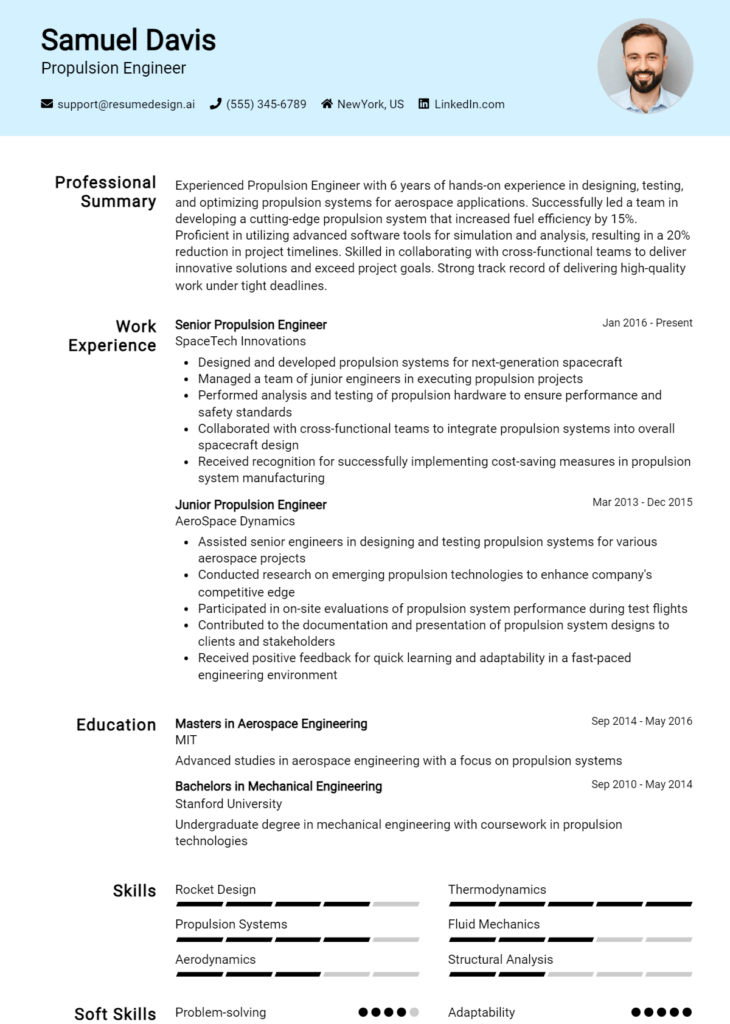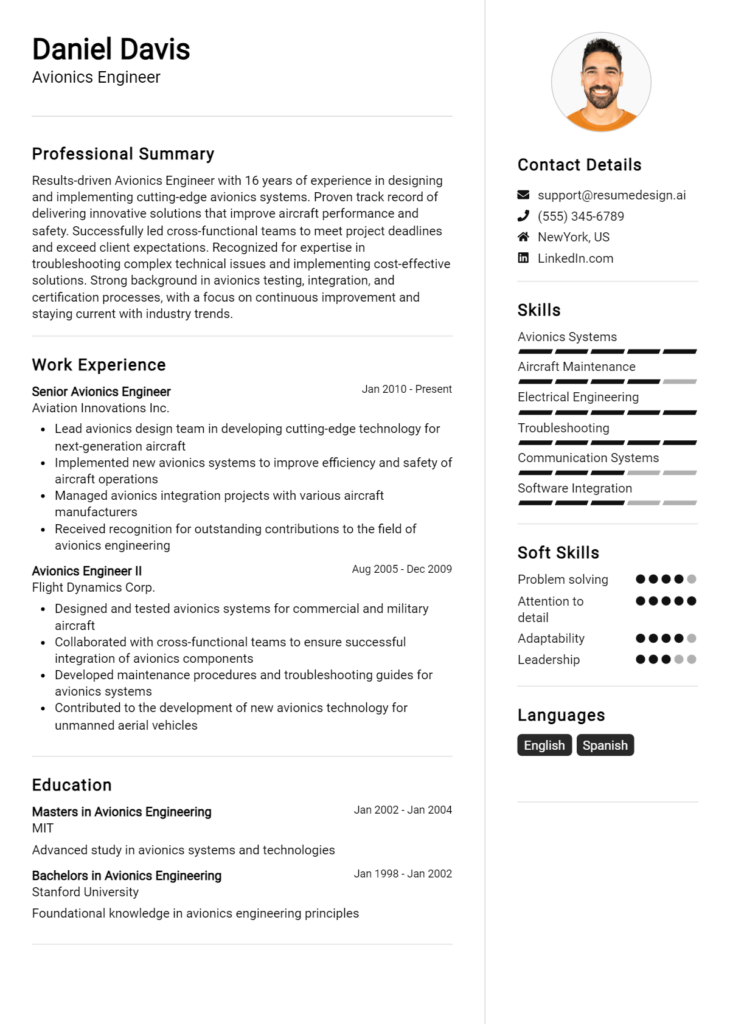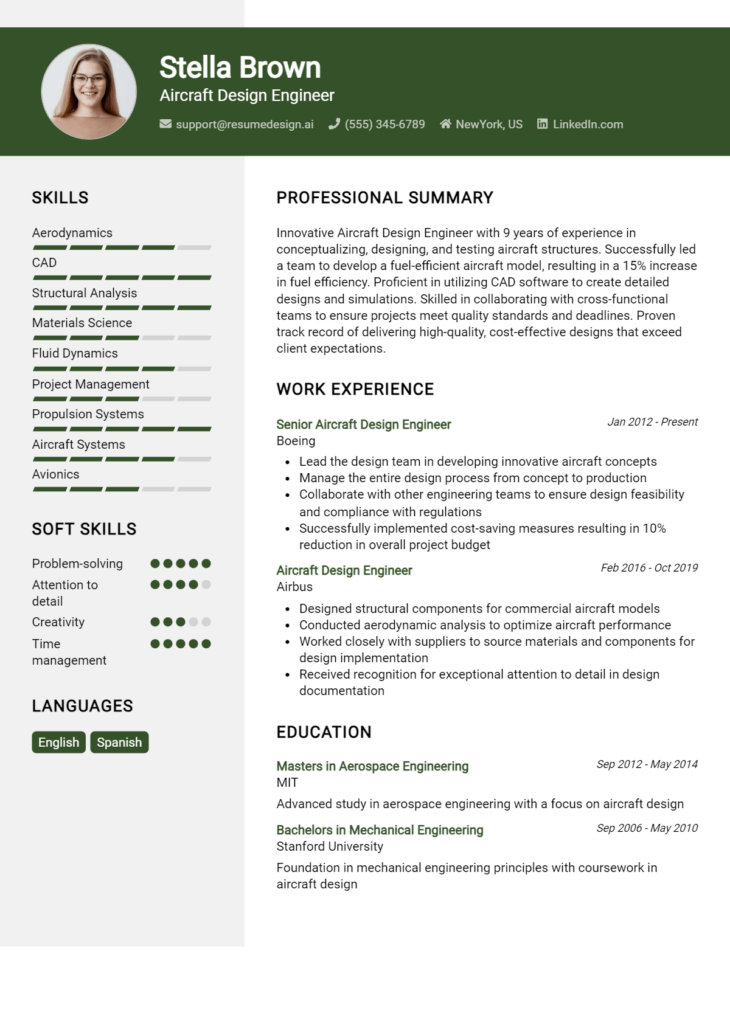Spacecraft Systems Engineer Core Responsibilities
A Spacecraft Systems Engineer plays a pivotal role in the design, development, and integration of spacecraft systems, bridging various departments such as avionics, propulsion, and software engineering. Key responsibilities include analyzing system requirements, ensuring compliance with safety standards, and conducting rigorous testing. Essential skills include technical expertise, operational acumen, and advanced problem-solving abilities, all of which are crucial for meeting organizational objectives. A well-structured resume can effectively showcase these qualifications, enhancing career prospects in this dynamic field.
Common Responsibilities Listed on Spacecraft Systems Engineer Resume
- Design and develop spacecraft systems and subsystems.
- Conduct system requirements analysis and verification.
- Collaborate with cross-functional teams for system integration.
- Perform risk assessments and implement mitigation strategies.
- Oversee spacecraft testing, including simulations and flight tests.
- Ensure compliance with industry standards and regulations.
- Develop and maintain technical documentation.
- Provide technical support during spacecraft operations.
- Participate in project planning and scheduling activities.
- Analyze data to improve system performance and reliability.
- Facilitate communication between engineering, management, and stakeholders.
High-Level Resume Tips for Spacecraft Systems Engineer Professionals
A well-crafted resume serves as a vital tool for Spacecraft Systems Engineer professionals, often being the first impression they make on potential employers. In a field that demands precision, innovation, and a robust understanding of complex systems, your resume must effectively showcase your unique skills and accomplishments. It should not only reflect your technical expertise but also narrate your contributions to successful projects that have propelled the aerospace industry forward. This guide will provide practical and actionable resume tips specifically tailored for Spacecraft Systems Engineer professionals, helping you create a compelling document that stands out in a competitive job market.
Top Resume Tips for Spacecraft Systems Engineer Professionals
- Tailor your resume to each job description, emphasizing relevant skills and experiences that match the specific role.
- Begin with a strong summary statement that highlights your years of experience, key accomplishments, and areas of expertise in spacecraft systems engineering.
- Showcase relevant experience, including internships, projects, and previous employment, with a focus on roles that involved spacecraft design, analysis, and testing.
- Quantify your achievements using metrics, such as the percentage of cost savings achieved or the number of successful missions supported, to illustrate your impact.
- Highlight industry-specific skills such as systems engineering principles, spacecraft dynamics, propulsion systems, and software tools like MATLAB and Simulink.
- Incorporate keywords from the job listing to ensure your resume passes through Applicant Tracking Systems (ATS) effectively.
- Include certifications and relevant coursework that demonstrate your commitment to professional development and expertise in the field.
- Utilize a clean and professional format, making it easy for recruiters to skim your resume and quickly identify key information.
- Proofread for errors and ensure consistent formatting to present a polished and professional image.
By implementing these tips, you can significantly increase your chances of landing a job in the Spacecraft Systems Engineer field. A well-structured and targeted resume not only showcases your qualifications but also demonstrates your attention to detail and commitment to excellence—qualities that are essential in the aerospace industry.
Why Resume Headlines & Titles are Important for Spacecraft Systems Engineer
In the competitive field of aerospace engineering, particularly for the role of a Spacecraft Systems Engineer, a well-crafted resume headline or title is crucial. It serves as the first impression for hiring managers, encapsulating a candidate's key qualifications in a single, impactful phrase. A strong headline can instantly grab attention, effectively summarizing the applicant's expertise and relevance to the job at hand. The effectiveness of a resume headline lies in its ability to be concise, relevant, and directly related to the specific position being applied for, setting the stage for the rest of the resume.
Best Practices for Crafting Resume Headlines for Spacecraft Systems Engineer
- Keep it concise: Aim for one impactful phrase that summarizes your qualifications.
- Be role-specific: Tailor your headline to align with the Spacecraft Systems Engineer position.
- Highlight your strengths: Focus on key skills, experiences, or accomplishments relevant to the role.
- Use industry-specific keywords: Incorporate terms that are commonly recognized in aerospace engineering.
- Showcase your uniqueness: Differentiate yourself from other candidates by emphasizing unique qualifications.
- Avoid jargon: While technical language can be important, ensure clarity for a broader audience.
- Engage the reader: Use action-oriented language that draws the hiring manager in.
- Update regularly: Revise your headline to reflect new skills or experiences relevant to the job market.
Example Resume Headlines for Spacecraft Systems Engineer
Strong Resume Headlines
"Experienced Spacecraft Systems Engineer Specializing in Orbital Mechanics and Payload Integration"
“Innovative Aerospace Engineer with 10+ Years in Spacecraft Design and Systems Analysis”
“Skilled Spacecraft Systems Engineer with Proven Track Record in Project Management and Cross-Functional Team Leadership”
Weak Resume Headlines
“Engineer Looking for a Job”
“Experienced Professional”
Strong headlines are effective because they are specific, highlight relevant expertise, and demonstrate the candidate's alignment with the role of a Spacecraft Systems Engineer. They utilize clear language and focus on accomplishments that resonate with hiring managers, making them more likely to engage with the resume. In contrast, weak headlines fail to impress due to their vagueness and lack of relevance, offering little insight into the candidate's qualifications and diminishing their chances of standing out in a crowded applicant pool.
Writing an Exceptional Spacecraft Systems Engineer Resume Summary
A well-crafted resume summary is crucial for a Spacecraft Systems Engineer, as it serves as the first impression a hiring manager has of a candidate. This brief section can quickly capture attention by highlighting key skills, relevant experience, and noteworthy accomplishments tailored to the specific job role. A strong summary should be concise and impactful, ensuring that it effectively communicates the candidate’s qualifications, ultimately increasing the chances of being called for an interview.
Best Practices for Writing a Spacecraft Systems Engineer Resume Summary
- Quantify Achievements: Use numbers and statistics to demonstrate the impact of your work.
- Focus on Relevant Skills: Highlight skills that align directly with the job description.
- Tailor the Summary: Customize your summary for each job application to reflect the specific requirements of the position.
- Be Concise: Keep the summary to 3-5 sentences to ensure clarity and maintain the reader's interest.
- Use Industry Terminology: Incorporate technical language and keywords from the aerospace industry.
- Showcase Problem-Solving Abilities: Emphasize your capacity to address complex engineering challenges.
- Highlight Team Collaboration: Mention experiences working in cross-functional teams on major projects.
- Demonstrate Passion for Space Exploration: Convey enthusiasm for the field and commitment to advancing technology.
Example Spacecraft Systems Engineer Resume Summaries
Strong Resume Summaries
Results-driven Spacecraft Systems Engineer with over 8 years of experience in designing and testing satellite systems, leading to a 30% reduction in development time. Proficient in systems integration, requirements analysis, and risk management, with a proven record of successful project delivery within budget constraints.
Dynamic engineer with expertise in spacecraft propulsion systems, contributing to the successful launch of 5 missions, which achieved a 95% on-time delivery rate. Skilled in collaborating with multidisciplinary teams to enhance system performance and reliability through innovative engineering solutions.
Detail-oriented Spacecraft Systems Engineer specializing in avionics and telemetry systems, with a track record of improving data transmission efficiency by 40% through advanced coding techniques. Committed to leveraging strong analytical skills to solve complex engineering problems in high-stakes environments.
Weak Resume Summaries
Experienced engineer looking for a position in spacecraft engineering. I have worked on various projects and have knowledge of systems.
Motivated professional with skills in engineering and a background in science. Seeking to apply my knowledge in a challenging role.
The examples above illustrate the difference between strong and weak resume summaries. Strong summaries are specific, quantifiable, and tailored to the role, showcasing relevant skills and accomplishments that align with the job description. In contrast, weak summaries lack detail, fail to convey measurable outcomes, and come across as generic, which diminishes their effectiveness in capturing the attention of hiring managers.
Work Experience Section for Spacecraft Systems Engineer Resume
The work experience section of a Spacecraft Systems Engineer resume is critical in demonstrating a candidate's technical expertise, leadership capabilities, and contribution to high-quality product development. This section provides potential employers with concrete evidence of the candidate's ability to design, analyze, and implement complex spacecraft systems. By effectively showcasing relevant experiences and quantifying achievements, candidates can illustrate their alignment with industry standards and the specific demands of the role. Highlighting successful projects and team management skills not only enhances the resume's impact but also positions the candidate as a valuable asset to any aerospace organization.
Best Practices for Spacecraft Systems Engineer Work Experience
- Clearly articulate technical skills relevant to spacecraft systems design, testing, and integration.
- Quantify accomplishments with specific metrics, such as project timelines, cost savings, and performance improvements.
- Highlight leadership roles and team collaborations to showcase project management capabilities.
- Use action verbs to convey a proactive approach in driving projects and initiatives.
- Tailor experiences to align with the job description and industry requirements.
- Include relevant software tools and technologies used in past roles to demonstrate technical proficiency.
- Focus on outcomes that showcase innovation and problem-solving skills in aerospace projects.
- Keep descriptions concise and impactful, avoiding jargon that may not resonate with all audiences.
Example Work Experiences for Spacecraft Systems Engineer
Strong Experiences
- Led a cross-functional team of 10 engineers in the successful development and launch of a satellite, achieving a 20% reduction in project costs through improved resource allocation.
- Designed and implemented a new telemetry system that increased data transmission efficiency by 35%, resulting in enhanced mission performance and reliability.
- Managed the integration and testing of propulsion systems for a deep-space probe, ensuring 100% mission success rate during critical flight phases.
- Collaborated with external partners to develop advanced spacecraft materials, reducing weight by 15% while maintaining structural integrity, leading to improved payload capacity.
Weak Experiences
- Worked on spacecraft projects, contributing to various tasks without specifying the outcome or impact of my contributions.
- Assisted team members with system testing and troubleshooting, but did not lead any initiatives or projects.
- Involved in the design process of spacecraft systems, but lacked quantifiable results or specific technologies used.
- Participated in meetings and discussions about spacecraft, with no clear mention of personal achievements or responsibilities.
The examples provided illustrate the distinction between strong and weak experiences based on their level of specificity and quantifiable achievements. Strong experiences effectively highlight concrete results, leadership roles, and collaborative efforts, showcasing the candidate's capability to deliver impactful work. In contrast, weak experiences lack detail, measurable outcomes, and clear contributions, which diminishes their relevance and effectiveness in demonstrating the candidate's qualifications for the Spacecraft Systems Engineer role.
Education and Certifications Section for Spacecraft Systems Engineer Resume
The education and certifications section of a Spacecraft Systems Engineer resume plays a crucial role in establishing a candidate's qualifications and expertise in a highly specialized field. This section not only showcases the candidate's academic background, including relevant degrees, but also highlights industry-relevant certifications and ongoing efforts in continuous learning. By providing detailed information about relevant coursework, certifications, and specialized training, candidates can significantly enhance their credibility and demonstrate their alignment with the job role, making them more appealing to potential employers.
Best Practices for Spacecraft Systems Engineer Education and Certifications
- Include degrees from accredited institutions that focus on aerospace engineering, mechanical engineering, or related fields.
- List industry-recognized certifications, such as Certified Systems Engineering Professional (CSEP) or relevant NASA certifications.
- Detail specialized training or workshops attended that pertain to spacecraft systems or related technologies.
- Highlight relevant coursework that directly applies to spacecraft design, systems integration, and mission planning.
- Keep the section updated with the latest certifications and educational achievements to reflect continuous professional development.
- Use clear and concise formatting to enhance readability, making it easy for hiring managers to locate key information.
- Prioritize information that aligns with the specific requirements of the job description.
- Consider including honors or awards received during educational pursuits that showcase excellence in the field.
Example Education and Certifications for Spacecraft Systems Engineer
Strong Examples
- M.S. in Aerospace Engineering, Massachusetts Institute of Technology (MIT), 2022
- Certified Systems Engineering Professional (CSEP), International Council on Systems Engineering (INCOSE), 2023
- Relevant Coursework: Orbital Mechanics, Spacecraft Dynamics, Systems Engineering Management
- Project Management Professional (PMP), Project Management Institute, 2021
Weak Examples
- B.A. in History, University of California, Berkeley, 2016
- Certification in Basic Computer Skills, Community College, 2019
- Relevant Coursework: Introduction to Psychology, 2017
- First Aid Certification, Red Cross, 2020
The strong examples are considered relevant and beneficial because they demonstrate an academic focus and professional credentials directly applicable to the role of a Spacecraft Systems Engineer. They show advanced degrees, industry-recognized certifications, and relevant coursework, which align well with the job requirements. Conversely, the weak examples lack relevance to the aerospace sector, featuring degrees and certifications that do not contribute to the candidate's qualifications for the position, thus diminishing their overall appeal to employers in the field.
Top Skills & Keywords for Spacecraft Systems Engineer Resume
As a Spacecraft Systems Engineer, having a robust set of skills is crucial for success in this highly specialized field. A well-crafted resume that highlights both hard and soft skills can significantly enhance your chances of landing a job. Employers seek candidates who not only possess the technical knowledge required for spacecraft systems but also demonstrate strong interpersonal abilities that foster collaboration and innovation. By focusing on the right skills, you can effectively showcase your qualifications and readiness to tackle the complexities of spacecraft design, development, and operation. To learn more about the importance of skills in your resume, consider how they align with the demands of the job position.
Top Hard & Soft Skills for Spacecraft Systems Engineer
Soft Skills
- Problem-solving
- Team collaboration
- Effective communication
- Critical thinking
- Time management
- Adaptability
- Attention to detail
- Creativity
- Leadership
- Conflict resolution
Hard Skills
- Systems engineering principles
- Knowledge of spacecraft design and operation
- Proficiency in simulation software (e.g., MATLAB, Simulink)
- Familiarity with spacecraft subsystems (e.g., propulsion, avionics)
- Project management skills
- Understanding of space mission requirements
- Experience with testing and validation processes
- Proficiency in programming languages (e.g., C++, Python)
- Data analysis and interpretation
- Knowledge of regulatory compliance and safety standards
By emphasizing these hard and soft skills in your resume, you can present a well-rounded profile that appeals to employers in the aerospace industry.
Stand Out with a Winning Spacecraft Systems Engineer Cover Letter
Dear [Hiring Manager's Name],
I am writing to express my interest in the Spacecraft Systems Engineer position at [Company Name], as advertised on [Job Board/Company Website]. With a Master’s degree in Aerospace Engineering and over five years of hands-on experience in spacecraft systems design and integration, I am excited about the opportunity to contribute to your innovative projects and help propel [Company Name] to new heights in space exploration. My background in systems engineering, along with my passion for advancing space technology, makes me a strong candidate for this role.
Throughout my career, I have successfully led various projects involving the design, analysis, and testing of spacecraft systems. My experience at [Previous Company Name] allowed me to work closely with cross-functional teams to ensure that all subsystems, including propulsion, avionics, and thermal control, were seamlessly integrated. I have a proven track record of identifying system-level requirements and developing solutions that meet both performance and reliability standards. My familiarity with tools such as MATLAB, Simulink, and various CAD software has enabled me to create detailed models and simulations that inform decision-making and optimize system performance.
I am particularly drawn to the vision of [Company Name] and its commitment to pioneering new technologies in the aerospace sector. I am eager to contribute my technical expertise and collaborative spirit to your team. I am confident that my skills in systems engineering and my proactive approach to problem-solving will help drive successful project outcomes. I look forward to the opportunity to discuss how I can contribute to your mission of exploring the cosmos.
Thank you for considering my application. I hope to bring my passion for aerospace engineering and my dedication to excellence to [Company Name]. I am excited about the possibility of working together to push the boundaries of space exploration.
Sincerely,
[Your Name]
[Your Phone Number]
[Your Email Address]
Common Mistakes to Avoid in a Spacecraft Systems Engineer Resume
When crafting a resume for a Spacecraft Systems Engineer position, it's vital to highlight the right skills and experiences while avoiding common pitfalls that could overshadow your qualifications. A well-structured and focused resume can make a significant difference in capturing the attention of hiring managers in the aerospace industry. Below are some common mistakes to avoid that can hinder your chances of landing an interview:
Generic Objective Statement: Using a one-size-fits-all objective statement can make your resume forgettable. Tailor your objective to reflect your specific interest in spacecraft systems engineering and how you can contribute to the organization.
Lack of Quantifiable Achievements: Failing to include quantifiable results from your previous roles can make your accomplishments less impactful. Use metrics to showcase your contributions, such as successfully reducing costs by a certain percentage or improving system efficiency.
Overly Technical Jargon: While it's important to demonstrate technical expertise, excessive jargon can alienate readers. Aim for a balance between technical language and clear explanations that can be understood by non-specialists.
Ignoring Relevant Experience: Not emphasizing relevant projects or internships can be a missed opportunity. Highlight experiences that directly relate to spacecraft systems, such as design projects, simulations, or collaborative work on aerospace missions.
Poor Formatting and Organization: A cluttered or difficult-to-read resume can detract from your qualifications. Use clear headings, bullet points, and consistent formatting to improve readability and make key information stand out.
Neglecting Soft Skills: Technical expertise is crucial, but soft skills like teamwork, communication, and problem-solving are equally important in engineering roles. Failing to mention these can give an incomplete picture of your capabilities.
Typos and Grammatical Errors: Simple mistakes can undermine your professionalism. Proofread your resume multiple times and consider having a peer review it to catch any errors you might have missed.
Omitting Continuous Learning: The aerospace field is constantly evolving, and not mentioning ongoing education, certifications, or relevant training can make you appear stagnant. Include any recent courses or certifications to demonstrate your commitment to staying current in the field.
Conclusion
As a Spacecraft Systems Engineer, you play a crucial role in the design, development, and operation of spacecraft systems. Your expertise ensures that all subsystems work seamlessly together, from propulsion and power to avionics and communications. This position requires a deep understanding of engineering principles, problem-solving skills, and the ability to work in multidisciplinary teams.
Key responsibilities include conducting system analyses, defining requirements, and ensuring that all components meet rigorous standards for safety and performance. You must stay updated with the latest technologies in aerospace engineering and possess strong project management skills to coordinate complex projects within tight deadlines.
In conclusion, as you reflect on the insights shared in this article, it's vital to assess your professional credentials and ensure your resume accurately reflects your skills and experiences as a Spacecraft Systems Engineer. To enhance your job application, consider utilizing resources that can help you stand out in a competitive field. Check out the available resume templates to find a design that suits your style, use our resume builder for a user-friendly experience, and review resume examples to get inspiration from industry peers. Don’t forget to craft a compelling introduction with our cover letter templates. Take the initiative today to refine your resume and boost your chances of landing that dream job in the aerospace sector!

